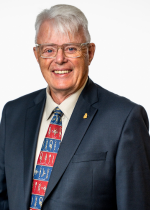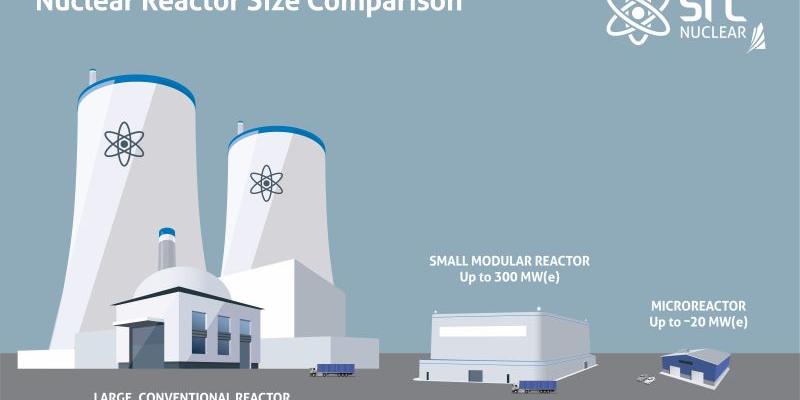SRC is pursuing the licensing and demonstration of the first nuclear microreactor in Saskatchewan.
Northern and remote areas of the province that are at the edge of the power grid or off-grid experience energy challenges, such as frequent brown outs or insufficient power for industry. Northern communities often rely on sources such as diesel or propane for their stable heat and power — but these sources are expensive and harmful to the environment.
Microreactors may be an ideal solution for these challenges and provide greater opportunity for socio-economic development.
SRC's Expertise
SRC has a long history of providing support and leadership to the uranium/nuclear industry throughout many stages of the production cycle, principally in exploration, mining and milling, mine remediation and environmental protection. SRC owns and operates the world’s largest uranium laboratory.
We successfully operated a small SLOWPOKE-2 nuclear research reactor for over 38 years and safely completed its decommissioning in the fall of 2021.
SRC is also managing Project CLEANS – a multi-year project to assess and remediate 37 abandoned uranium mine and mill sites in northern Saskatchewan.
Now, our goal is to deploy microreactor technology for multiple uses across Saskatchewan as one of many potential solutions to the province’s unique energy needs.
SRC Nuclear Inc. Board of Directors
SRC has established a wholly- owned subsidiary called SRC Nuclear Inc., which will hold the CNSC license(s) to operate microreactors. SRC is the sole shareholder.
 George Prudat is a retired Royal Canadian Navy Commander and was the Captain of HMCS Nipigon, a helicopter equipped destroyer. He has more than 20 years of seagoing service in ships that operated globally and more than 15 years of experience at the senior executive level.
George Prudat is a retired Royal Canadian Navy Commander and was the Captain of HMCS Nipigon, a helicopter equipped destroyer. He has more than 20 years of seagoing service in ships that operated globally and more than 15 years of experience at the senior executive level.
George is a graduate of Memorial University (BMS), a graduate of the Canadian Forces Command and Staff College (pcsc) and holds a Professional Governance qualification. After retiring from the Navy he was employed at the Centre for Operational Analysis, a research centre within Defence Research and Development Canada (DRDC).
George is a Board Member of the North West College and formerly served as the Mayor of St Walburg.
 Norm is the former Sr. Vice President, Potash Operations for The Mosaic Company. While at Mosaic, he had overall responsibility for the Potash Business Unit’s (PBU) six mining operations in Canada and the USA. Under Norm’s leadership, the PBU launched a $6.0 billion expansion campaign to add in excess of 5 million tonnes of production capacity in the Saskatchewan operations.
Norm is the former Sr. Vice President, Potash Operations for The Mosaic Company. While at Mosaic, he had overall responsibility for the Potash Business Unit’s (PBU) six mining operations in Canada and the USA. Under Norm’s leadership, the PBU launched a $6.0 billion expansion campaign to add in excess of 5 million tonnes of production capacity in the Saskatchewan operations.
Norm has a bachelor’s degree in Mechanical Engineering from the University of Saskatchewan. In addition to sitting on SRC’s board, he is currently Chair of the Tourism Saskatchewan Board. He is a former board member of SaskEnergy and Technical Safety Authority of Saskatchewan (TSask) and the former Chairperson of the Canadian Fertilizer Institute. Norm is Past President of the Saskatchewan Mining Association, Past Chair of the Saskatchewan Potash Producers Association, and was a board member for the Regina Symphony Orchestra and the Hospitals of Regina Foundation. He is the past honorary chair of the Saskatchewan Roughriders Centennial Advisory Committee.
 Mike Crabtree is President and CEO of SRC, leveraging over 30 years of experience in energy and clean tech with a strong emphasis on innovation and R&D in those two sectors. His international footprint extends across 30 countries in Europe, Africa, North America and the Middle East. Holding a bachelor’s degree in chemistry and a master’s degree in petroleum engineering, Mike chairs several Canadian and US companies and has raised hundreds of millions of dollars from government and private investors for successful new technology ventures.
Mike Crabtree is President and CEO of SRC, leveraging over 30 years of experience in energy and clean tech with a strong emphasis on innovation and R&D in those two sectors. His international footprint extends across 30 countries in Europe, Africa, North America and the Middle East. Holding a bachelor’s degree in chemistry and a master’s degree in petroleum engineering, Mike chairs several Canadian and US companies and has raised hundreds of millions of dollars from government and private investors for successful new technology ventures.
Prior to SRC, he was an executive board member at Carbon Engineering Inc, focusing on direct air capture of carbon dioxide. Mike also founded and led Oilflow Solutions Inc, an oilfield services company, and held numerous senior executive roles at Schlumberger Inc.
Currently, he is leading SRC on the development of North America’s first vertically integrated Rare Earth Processing Facility, which will be operational in 2024 and introducing the world's first eVinciTM microreactor into Saskatchewan before the end of the decade.

Dan McDermid is the Chief Nuclear Officer and Vice-President of SRC Nuclear and is responsible for the licensing and demonstration of a microreactor in Saskatchewan. Dan brings nearly two decades of experience in the nuclear energy sector to his role, with a career spanning throughout engineering, maintenance and operations.
Prior to joining SRC, Dan served as the Director of Operations Production at a 3.6 GWe nuclear power plant, where he leveraged his hands-on experience in nuclear plant environments to lead the successful return to service of three reactors following a multi-billion dollar refurbishment. This role highlighted Dan's leadership and ability to manage large-scale projects effectively.
Dan holds degrees in Electrical Engineering from the University of Waterloo, Nuclear Engineering from McMaster University and an MBA from the University of Toronto. Additionally, Dan has held several reactor licenses from the Canadian Nuclear Safety Commission.
At SRC, Dan focuses on delivering microreactors to Saskatchewan, aiming to unlock socioeconomic benefits for local industry and communities. Dan's leadership is characterized by a commitment to innovation, safety and sustainability — driving SRC Nuclear's mission forward.
Regulatory Oversight
The Canadian Nuclear Safety Commission (CNSC), an agency of the Government of Canada, regulates the use of nuclear energy and materials in Canada to protect health, safety, security and the environment.
To become an operator of a microreactor, SRC Nuclear will require a number of licenses through CNSC, including a license to prepare the site, a license to construct a facility for the microreactor, and a license to operate a microreactor.
Engagement
Robust engagement with Indigenous rights holders, the general public, government, industry and other interested parties will occur throughout these licensing processes, and will be key to the successful implementation of microreactors in Saskatchewan.
Indigenous Engagement
SRC’s Nuclear offices are situated on Treaty 6 territory and the traditional Homeland of the Métis. We strive to establish respectful, transparent, collaborative and mutually beneficial relationships with Saskatchewan’s Indigenous Nations, communities and organizations as SRC advances nuclear microreactor technology for clean energy generation, particularly in northern, remote and industrial contexts.
Our Indigenous engagement is guided by and in accordance with the CNSC’s Regulatory Document REGDOC-3.2.1, Public Information and Disclosure and Regulatory Document REGDOC-3.2.2, Indigenous Engagement. These Regulatory Documents can be found on the CNSC website.
Our Indigenous engagement activities also align with SRC’s Indigenous Action Plan.

